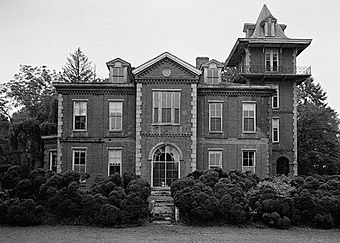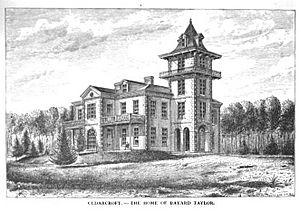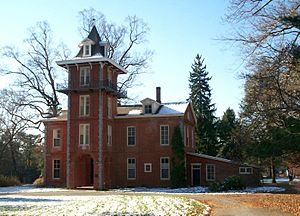Cedarcroft facts for kids
|
Cedarcroft
|
|

Cedarcroft in 1960
|
|
| Nearest city | Kennett Square, Pennsylvania |
|---|---|
| Built | 1859 |
| Architect | Bayard Taylor |
| NRHP reference No. | 71000693 |
Quick facts for kids Significant dates |
|
| Added to NRHP | November 11, 1971 |
| Designated NHL | November 11, 1971 |
Cedarcroft, also known as the Bayard Taylor House, is a special old house in Chester County, Pennsylvania. It's close to Kennett Square. This house was built in 1859 for a famous writer named Bayard Taylor (1825–1878). It's a great example of a building style called Italianate architecture.
Cedarcroft was Taylor's home until 1874. He wrote many of his well-known books and poems there. For most of its history, it has been a private home. But for a few years in the early 1900s, it was a private school for boys. In 1971, Cedarcroft was named a National Historic Landmark. This was because of its important connection to Bayard Taylor.
Contents
History of Cedarcroft
Building a Dream Home
Bayard Taylor built the large house he called Cedarcroft between 1859 and 1860. It was located near Kennett Square, Pennsylvania. He personally watched over its construction. The house had thick two-foot walls and a tall tower. Taylor even wrote articles about building his home.
He also owned about 200 acres of land around the house. He had spent several years buying this land. Taylor described the house as "large and stately." He said it was "simple in its forms, without much ornament." He wanted it to show "strength and ornament."
Taylor lived here with his wife, Marie Hansen. She was the daughter of a Danish/German astronomer. They got married in 1857.
Life and Writings at Cedarcroft
Many of Taylor's writings were created at Cedarcroft. Some even mentioned the house. For example, his 1863 book The Poet's Journal was dedicated to his wife. He called her "the Mistress of Cedarcroft."
Taylor wanted to finish his new home quickly. This was especially true after his daughter Lilian was born in 1858. He wrote more for magazines and gave many lectures to earn money. He laid the first stone for the house's tower on June 9, 1859. Inside, he hid a time capsule.
He wrote that this metal box held coins and a newspaper. It also had a copy of his book Views Afoot. Plus, there was "an original poem by me." He hoped someone would read it "five hundred years hence."
When the family moved in during 1860, they put on a funny play. Taylor wrote it with his friend Richard Henry Stoddard. Cedarcroft hosted many other famous writers. These included George Henry Boker and Ralph Waldo Emerson.
Outside the house, Taylor planted many fruits and vegetables. He also planted a giant sequoia tree from California. There was ivy, Virginia creeper, and wisteria. After visiting, Sidney Lanier wrote a poem. It was called "Under the Cedarcroft Chestnut." It was about a very old tree there.
The first major work Taylor wrote at Cedarcroft was The Poet's Journal. He wrote this series of poems about his own life within a month of moving in. It was published in 1862.
Challenges and Changes
Building Cedarcroft cost $15,000 by February 1860. This was $5,000 more than he expected. It left Taylor with money problems. His life in Kennett Square became even harder when the American Civil War started in 1861.
He wrote to his friend Stoddard in April. He said, "Everything here is upside down." He mentioned "rumors of war flying about us." He even bought weapons and buried his writings for safety. Then he left the country to visit Europe.
Because of money and country problems, Taylor only spent four of the first eight summers at Cedarcroft. He traveled, gave lectures, and wrote in New York instead. In 1862, he was a main reporter for the New York Tribune. He visited the army and reported on Congress.
Later that year, he took a job helping his country in Russia. But the job didn't last long. His money problems continued. By 1870, Taylor complained to his mother. He said if he had known how much things would change, he never would have built Cedarcroft. He admitted his idea of country life mixed with writing was "a dead failure." By 1875, he left the house in the care of his family.
After Bayard Taylor
Bayard Taylor passed away in Germany on December 19, 1878. Cedarcroft stayed in the Taylor family until 1882. That year, his wife Marie and daughter Lilian sold the house. They also sold the remaining 116 acres of land for $14,050.
New Owners and a School
In September 1905, Cedarcroft became a private school for boys. A new three-story building was added behind it. The first class had seven boys. Jesse Evans Philips was the principal. Later, between 32 and 40 boys attended each year.
A Famous Baseball Player
One of the school's students was a future professional baseball player named Herb Pennock. When he was 18, Pennock signed with the Philadelphia Athletics in 1912. He later played for the Boston Red Sox and the New York Yankees. Pennock was called "The Squire of Kennett Square." He was put into the baseball hall of fame in 1948 after he passed away.
A National Landmark
The house was officially named a National Historic Landmark in 1971. Today, Cedarcroft is surrounded by a neighborhood of mostly similar houses. These houses were built in the 1950s. Cedarcroft stands at the corner of Gatehouse Drive and Potter Road.
 | Madam C. J. Walker |
 | Janet Emerson Bashen |
 | Annie Turnbo Malone |
 | Maggie L. Walker |





